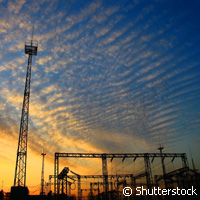Europeans driving electrical power
Researchers in Germany are developing new electronic components that will help energy infrastructures adapt to the growing use of renewable energy sources and cut energy losses during transmission. As things stand now, power is lost during its journey along the electricity wires to users. The team from the Fraunhofer Institute for Integrated Systems and Device Technology (IISB) in Germany discovered that a reliable power supply is the critical component behind the infrastructure. The cable infrastructure consists of various switching points that reduce the voltage, helping equipment tap into the power at low voltage. 'A reliable power supply is the key to all this, and major changes will take place in the coming years to safeguard this reliability,' explains IISB head Professor Lothar Frey. 'The transport and power networks will grow together more strongly as a result of electromobility, because electric vehicles will not only tank up on electricity but will also make their batteries available to the power grid as storage devices. Renewable energy sources will become available on a wider scale, with individual households also contributing electricity they have generated.' A case in point is the global DESERTEC project, which targets harnessing solar and wind energy in deserts worldwide. Locations that are currently in DESERTEC's spotlight are North Africa and the Middle East. Consumers will receive the generated electricity via long high-voltage power lines or undersea cables. The researchers added that cables, systems and components already in use will have to be adapted to the future energy mix. Doing so will ensure that consumers receive electricity reliably and with as few losses as possible. The IISB team is mulling over solutions and developing components to convert electrical energy efficiently. According to the team, more and more direct current is being used to transmit energy for distances that are over 500 kilometres or for cables located under the sea. This system ensures constant voltage and keeps consumption low; 7% maximum of power is lost over long distances compared with a 40% loss for alternating current. The researchers said more converter stations are needed to convert the high voltage of the direct current into the alternating current required by the consumer. 'In cooperation with Siemens Energy [Germany] we are developing high-power switches,' IISB's Markus Billmann pointed out. 'These are necessary for transmitting the direct voltage in the power grid and are crucial for projects like DESERTEC. The switches have to be more reliable, more scalable and more versatile than previous solutions in order to meet the requirements of future energy supply networks.' In order to achieve this goal, the team is using inexpensive semi-conductor cells which with previous switching techniques could not be used for high-voltage direct-current transmission (HVDCT). 'At each end of a HVDCT system there is a converter station,' Mr Billamann said. 'For the converters we use interruptible devices which can be operated at higher switching frequencies, resulting in smaller systems that are easier to control.' The researchers are determined to protect cells from damage. Some 5,000 modules will be contained in each converter station. Normally, failure of these modules, which will be connected in series, would result in a chain reaction and damage the entire station. The IISB has changed this. 'We have now solved this problem. With our cooperation partners we are working on tailor-made materials and components so that in future the equipment will need less energy,' Mr Billmann pointed out.
Countries
Germany



